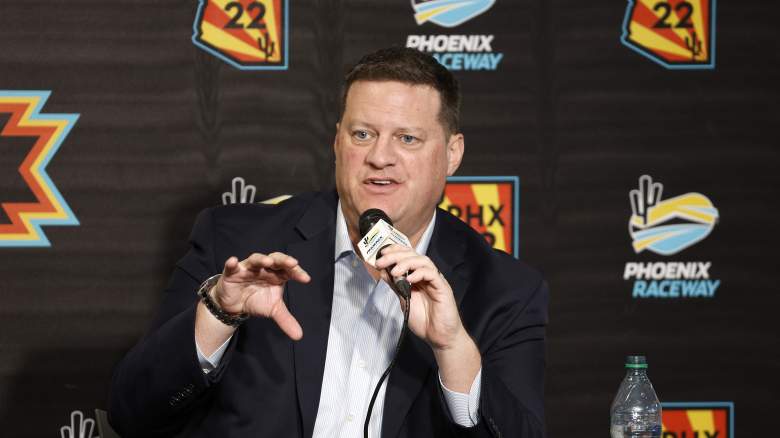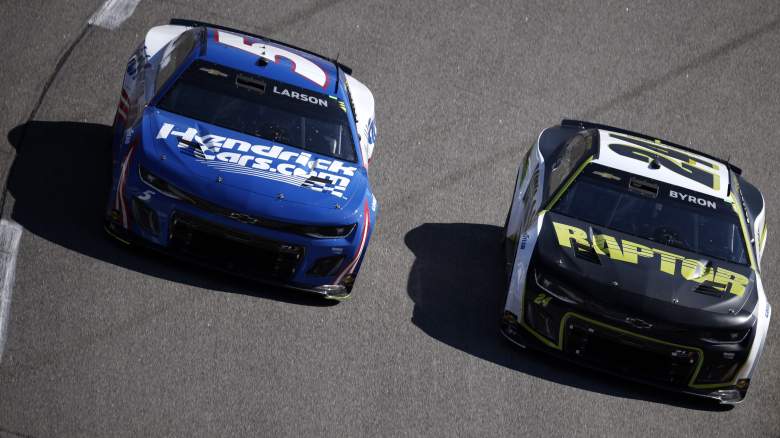
Getty Steve O'Donnell has addressed the NASCAR Rule Book changes.
The appeals process has been the center of attention in recent weeks, especially with decisions about Hendrick Motorsports and Kaulig Racing. Now, NASCAR has made a significant update to the Rule Book.
According to an April 6 update, NASCAR has amended the language in Section 10.5.2. It now says that the “National Motorsports Appeals Panel and final appeal officer may not completely strike any element of an originally assessed penalty.”
These parties can make adjustments to the original penalty, but they have to fit within a specific range. For example, if NASCAR issues a penalty that includes three elements — fine, suspension, and points reduction — the appeals panel can not remove one of these elements while keeping the others. They can either overturn the full penalty or make reductions within the allowed range.
Take the L2-Level penalties that debuted ahead of the 2022 Cup Series season for example. The possible penalties for an L2 violation include point deductions between 75-120 points, playoff point deductions between 10-25, the suspension of one or two crew members for four to six races, and fines between $100,000-$250,000.
If NASCAR issued a penalty that included a six-race suspension for two crew members, a $200,000 fine, and the loss of 100 points, the appeals panel could reduce these amounts while agreeing that the team had committed the violation. They just could not go below 75 points, $100,000, and four races.
2 Separate Appeals Created This Conversation

GettyHendrick Motorsports partially won its appeal.
The reason why this became a larger conversation is that two different Chevrolet teams received L2-Level penalties for the same violation. Both appealed, but one left the conference room in a much better position.
Hendrick Motorsports, which appealed first, had received L2-Level penalties for unapproved modifications to a single-source part (hood louvers). NASCAR officials had confiscated eight hood louvers after practice at Phoenix Raceway.
The appeals panel determined that HMS violated the rules, and it upheld the $100,000 fines and four-race suspensions issued to the four crew chiefs. However, the appeals panel rescinded the points penalties.
Kaulig Racing, for comparison, had one hood louver confiscated after practice at Phoenix Raceway. The No. 31 team received the same L2-Level penalty, which led to an appeal the week after HMS presented its case.
The appeals panel, which featured different members than the HMS appeal, determined that Kaulig Racing also violated the NASCAR Rule Book. It upheld the fine and suspension issued to crew chief Trent Owens. The appeals panel also kept the points penalty while reducing it from 100 to 75.
“I think we always have put the rules in place to be transparent and consistent across the board,” NASCAR COO Steve O’Donnell said on April 6. “So our penalties have been consistent, we’ve issued consistent penalties. We were surprised, as I think a lot of the fans were in the ruling, particularly on the Hendrick [appeal] taking away all points.
“So we recognize that our system had a flaw. And if someone was found to have violated the rule, we’ve stated that we were all about a culture change in the garage with this new car, and points need to be part of any penalty going forward.”
Another Update Focused on Transparency
The first significant update to the NASCAR Rule Book focused on the appeals process and the changes that the panel could make after hearing the respective cases.
The second update focused on transparency. There have been numerous conversations about the reasoning behind specific decisions by the appeals panel.
Denny Hamlin, in particular, said in an “emergency episode” of his “Actions Detrimental” podcast that he didn’t receive an explanation as to why the panel upheld the penalties issued for his contact with Ross Chastain at Phoenix Raceway.
The latest update to the Rule Book now states that NASCAR can publish the reasoning from the appeals panel or final appeal officer for modifying or rescinding a penalty if it so desires.
This change won’t provide complete transparency regarding the appeals process. What it will do is clear up some of the murkier situations that have created negative conversations in the industry.